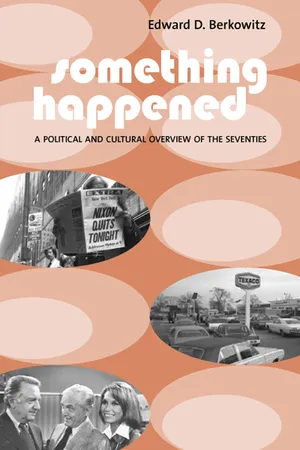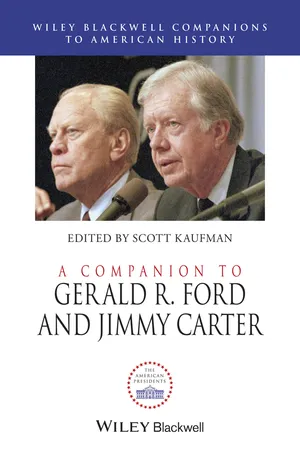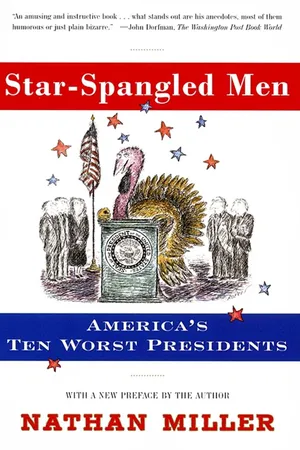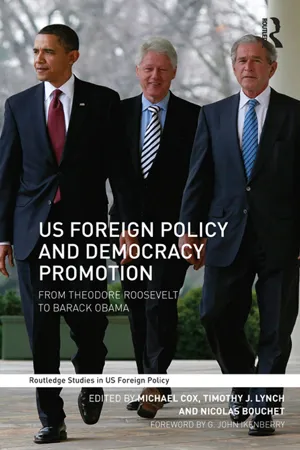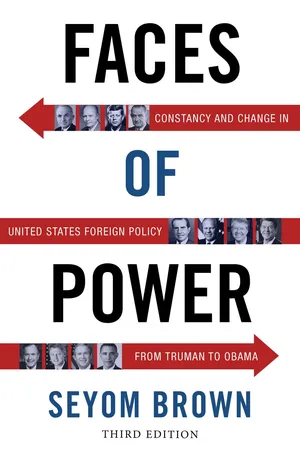History
Jimmy Carter
Jimmy Carter served as the 39th President of the United States from 1977 to 1981. He is known for his efforts to promote human rights and his role in brokering the Camp David Accords, which led to a peace treaty between Israel and Egypt. Carter's presidency was marked by energy crises and economic challenges, and he later became a prominent advocate for humanitarian causes.
Written by Perlego with AI-assistance
Related key terms
7 Key excerpts on "Jimmy Carter"
- eBook - ePub
Something Happened
A Political and Cultural Overview of the Seventies
- Edward Berkowitz(Author)
- 2005(Publication Date)
- Columbia University Press(Publisher)
6 Jimmy Carter and the Great American RevivalJimmy Carter, who succeeded Ford after the 1976 election, hoped to lead a great American revival. He wanted to synthesize what was best about postwar America, such as the technological and policy expertise that promoted a form of compassionate efficiency, while also returning America to its bedrock virtues such as the necessity of telling the truth in public life. He hoped that, with the proper moral and political leadership, Americans would be able to face up to their problems, making the necessary sacrifices if necessary, and conquer stagflation, the energy crisis, corruption, and a host of other seventies ills. Although Carter made a difference, he could not overcome a new surge of problems that occurred during his presidency. As a result, the crisis of the seventies, which had begun under Nixon and the Republicans, became associated with Carter and the Democrats.THE RISE OF JIMMY CARTERThe election of Jimmy Carter marked a pronounced change in the presidency. He was not a member of Congress and, in fact, was the first president without Washington experience since Woodrow Wilson. He also came from a different generation than did his predecessors. Carter, unlike Gerald Ford and the four presidents before him, did not serve in a combat zone during the Second World War. He graduated from high school just before Pearl Harbor and, after further preparation at some Georgia colleges, eventually entered the Naval Academy. By the time he finished at the academy, however, the war had ended, and he did his military service in the peacetime navy. He chose submarines as his area of specialty and helped to train the crew for the USS Seawolf, a nuclear-powered submarine. After seven years of service, he left the navy in 1953 with his father ill with cancer and with his chances for long-term advancement in the navy uncertain. After his father died, Carter settled down in his home town of Plains, Georgia, much to the consternation of his wife and brother, and took over the family’s farm and warehouse business. Like Harry Truman, who had also been stuck on his family farm, Carter found an outlet in local politics. As a prominent landowner and therefore a leading figure in the county, Carter accepted his duty to serve on county boards that ran local institutions, such as the schools and the library and hospital. In 1962, at the age of thirty-eight, he was elected to the Georgia State Senate and served there through 1966. In that year he made an unsuccessful run for governor; in the next election he ran again and won.1 - eBook - ePub
- Scott Kaufman(Author)
- 2015(Publication Date)
- Wiley-Blackwell(Publisher)
Yet even this unusual, dramatic turnaround in public attitudes had a flip side. Despite, and even because of, his rising popularity, Carter remained a polarizing figure. Brinkley noted that the media produced two kinds of reports during the “Carter resurgence” of the 1990s: those that “mythologized him as a seventy-year-old ‘peace outlaw,’ prevailing through personal wisdom, inner drive, selflessness, and uncanny timing,” and those that “derided him as a vain, sanctimonious, born-again interloper seeking political redemption via the Nobel Committee” (Brinkley, 1998: xvii). Some claimed that he was on an ego-driven quest to insert himself into public affairs and to do penance for his failures as president. Others argued that he was gunning for publicity and the Nobel Prize. (At least one member of the Nobel Committee did admit that Carter’s 2002 award was intended, in part, as a commentary on the George W. Bush administration.) Carter also broke unwritten protocol by criticizing sitting presidents, and he seemed ever willing to meet with authoritarian pariahs like Fidel Castro and Kim Il-sung. “Jimmy Carter never met a dictator he didn’t like,” went the conservative refrain. Steven F. Hayward spoke for many critics when he assailed “the myth of St. Jimmy” and Carter’s efforts to become “the American Gandhi.” Hayward asserted in a book-length polemic, “Not since Theodore Roosevelt has an ex-president been as peripatetic or troublesome to his successors as Jimmy Carter” (Hayward, 2004: 195).Governance and Domestic Policies
Scholarly assessments of the Carter presidency run a wide gamut, but they have been far less polemical than the work of Hayward and other pundits. Leaving aside the debate about Carter’s post-presidential life, the conventional academic wisdom on his governance and domestic policies has evolved in line with the changing times and the increasing availability of archival material. On the positive side, there is a general consensus that Carter was intelligent, hard-working, and morally upstanding. There is also basic agreement that Carter was elected during a uniquely difficult era for governance. The public did not trust Washington, the presidency was weakened by Watergate and Vietnam, and interest groups had grown more plentiful and more powerful. Several scholars define the Carter era as a time of national “limits” and thus also a time of limited political possibilities. These scholars argue that Carter actually accomplished a great deal considering the hostile contemporary environment. - eBook - ePub
The Presidential Difference
Leadership Style from FDR to Barack Obama - Third Edition
- Fred Greenstein(Author)
- 2012(Publication Date)
- Princeton University Press(Publisher)
I had a different way of governing than my predecessors. I was a southerner, a born-again Christian, a Baptist, a newcomer. Very few of the members of Congress, or members of the major lobbying groups, or the distinguished former Democratic leaders had played much of a role in my election. As an engineer and as a governor, I was more inclined to move rapidly and without equivocation and without the interminable consultations and so forth that are inherent, I think, in someone who has a more legislative attitude, or psyche, or training, or experience.– JIMMY CARTER,INTERVIEW , 1982E very president from Franklin Roosevelt to Gerald Ford had spent a decade or more in responsible public positions in and out of the nation’s capital before entering the White House. Jimmy Carter’s previous governmental service consisted of one term as governor of Georgia and two as a member of that state’s legislature. That someone with modest political experience, none of which was national, could become president of the United States would have been highly unlikely until the 1970s. Carter made his way to the White House at a time when established leaders were in ill repute, and he won his party’s nomination as a result of the post-1968 presidential nominating process, which drastically reduced the influence of traditional political party power brokers.Carter stood out in another respect. Public figures regularly refer to God in American politics, and in most jurisdictions, a leader’s assertion that he or she did not believe in a supreme being would be a ticket to oblivion. Religious doctrine, however, rarely finds its way into public affairs, except indirectly through such issues as school prayer, abortion, and gay rights. Carter stands alone among the modern presidents in the centrality of religious principles to his political leadership and, indeed, his very being.In the Hollywood classic Mr. Smith Goes to Washington , an idealistic political outsider prevails over Washington officialdom. For a few short months, Jimmy Carter seemed to be another Mr. Smith, but his honeymoon ended well before the end of his first year in the White House. By the summer of 1980, Carter’s approval ratings had reached abysmally low levels, and very little of his policy agenda had made its way into the statute books. In November, the voters returned him to private life, where he earned ironic acclaim for his Nobel Prize-winning performance as an ex-president.1 - eBook - ePub
Star-Spangled Men
America's Ten Worst Presidents
- Nathan Miller(Author)
- 2008(Publication Date)
- Scribner(Publisher)
5 This apparent lack of purpose helped to make Carter a target from almost every quarter. No political faction could be certain that he was an ally, and none owed him any loyalty. As a result, he was unable to organize coalitions. Carter also faced an aggressive and truculent Congress, which having recently deposed a president was arrogantly assertive of its powers. Even though controlled by his fellow Democrats, it paid little heed to the president’s program or to supporting his initiatives.Carter was not without his successes, however, especially in the field of international affairs, even though he was, in the words of Henry L. Trewhitt, the diplomatic correspondent of the Baltimore Sun, “a local and regional politician with no global experience” who was “squeamish … even naive—about the use of power.”6 He fought doggedly for the Panama Canal treaty that is to turn full sovereignty of the Canal Zone over to Panama as of December 31, 1999, thereby healing a running sore in the nation’s relations with Latin America. Carter’s greatest triumph was the brokering of the Camp David accords in which Egypt and Israel ended their long state of war, raising hopes for peace in the Middle East. On the other hand, having naively disregarded warnings of Soviet intentions, he was surprised and embittered by the Soviet invasion of Afghanistan in 1979. And there was Iran.In mind and character, Carter reminded most observers of Woodrow Wilson. Both were Southerners and had a sanctimoniousness and arrogance that invited anger and resentment. People wryly noted that his initials were not J.C. for nothing. Hugh Carter, a cousin, saw him as a “lay missionary” who was in harmony between his own ambition and larger spiritual and political purposes.7 Like Charles de Gaulle at the time of the fall of France in 1940, he offered himself to the nation. “He was and is a moral leader more than a political leader,” comments Hendrik Hertzberg, a onetime Carter speechwriter. “He spoke the language of religion and morality far more, and far more effectively, than he spoke the language of politics.”8Carter’s outsider image and calls for a spiritual awakening played well during his campaign for the Democratic nomination in 1976. The voters were turned off by artifice, insincerity, and Madison Avenue packaging—anything that smacked of manipulation and lies. Evidence abounded that, behind Carter’s, smile and promises not to lie to the American people, he was a shrewd professional politician not above using half-truths and untruths to win. But his seeming simplicity, his lack of bombast, even his Sunday-school-teacher awkwardness were appealing. - eBook - ePub
US Foreign Policy and Democracy Promotion
From Theodore Roosevelt to Barack Obama
- Michael Cox, Timothy J. Lynch, Nicolas Bouchet(Authors)
- 2013(Publication Date)
- Routledge(Publisher)
Yet the general verdict on Carter’s foreign policy is still generally negative. He is seen by some on the right as the naive idealist who came belatedly to embrace a more coherent anti-communism after 1978. More left-leaning commentators commend the early foreign policy and deplore the proto-Reaganism of his reaction to the Soviet invasion of Afghanistan in 1979. Many commentators across the political spectrum see Carter’s foreign policy leadership as fundamentally confused – both in terms of its goals and its internal management. 2 On the narrower theme of democracy, Carter’s stance and record are difficult to assess. His position on democracy promotion was structured around the prior commitment to ‘human rights’ as the guiding principle (especially early in his presidency) of foreign engagement. The commitment to democracy promotion was also profoundly affected by the underlying dynamic of the administration – the move towards more orthodox policies of containment of communism in the later period – and by the intense bureaucratic and personal rivalries between White House and State Department. This chapter begins with a consideration of the administration’s general commitment to human rights, focusing particularly on President Carter’s own understanding of the concept and its links to democracy promotion. It discusses the operationalization of the policy, especially in the context of the bureaucratic politics of the administration. How far did the human rights policy succeed in its goals? To what extent did it help or hinder the cause of global democracy? There follows a section on policy towards the Soviet Union. What was Carter’s contribution to the unravelling of Soviet communism? The policy Jimmy Carter’s commitment to human rights in foreign policy was developed in a rather ad hoc fashion on the campaign trail in 1976 - eBook - ePub
Faces of Power
Constancy and Change in United States Foreign Policy from Truman to Obama
- Seyom Brown(Author)
- 2015(Publication Date)
- Columbia University Press(Publisher)
Time), and prominent multinational corporation directors. It was largely from his Trilateral Commission contacts that candidate Carter formed his Foreign Policy and Defense Task Force and subsequently his top-level and sub-cabinet appointments to his administration.Carter’s success as presidential candidate was largely attributable to his ability to present himself variously as populist and establishmentarian, human rights idealist and geopolitical realist, country boy and impeccably mannered dinner-party host, Bible-quoting “born-again Christian” and devotee of existentialism. He was credible in each of these roles, depending upon whom he was talking with, and—most remarkably—credible also in his professions of guileless honesty.5 The aura of credibility undoubtedly was a reflection of the fact that all these facets were the real Jimmy Carter, that he indeed was an amalgam of all of them, and a true believer in the mystical ethos that this was the essence of the nation he felt called upon to represent. With Walt Whitman’s America, he could proclaim: “Do I contradict myself? / Very well then I contradict myself, / (I am large, I contain multitudes.)”Some of Carter’s main problems as president appear to have stemmed from his continuing to display in his executive role the all-things-to-all-people quality that got him elected. To give vent in the Oval Office to the contradiction-laden instincts of Mr. Everyman was to fail to establish and stick to priorities among values and objectives without which consistent and credible policy is impossible to sustain. Each of Carter’s most trusted advisers sensed that the chief was most sympathetic with one’s own approach and would carry back to subordinates and sometimes to the public such presidential guidance as one wanted to (and did) hear. Moreover, the president himself, often giving expression to the formulations of his different advisers, frequently would deliver himself in policies and pronouncements of a sequence of inconsistent moves and postures. - eBook - ePub
American Politics and Presidents
From TR to Donald Trump
- Robert Dallek(Author)
- 2020(Publication Date)
- Harper(Publisher)
In 1974, as Carter’s gubernatorial term was coming to an end, he saw Nixon’s demise as an unprecedented chance for a populist Democrat to win the White House. As president, Eizenstat asserts, Carter lacked many of the principal attributes of most twentieth-century presidents. “But,” Eizenstat adds, Carter “brought to the Oval Office his own unique intellect, inquisitiveness, self-discipline, political courage, and resilience in the face of setbacks.” Most of all, he is now recalled for his morality—his unyielding commitment to Christian principles of honesty and humane treatment of peoples everywhere, as well as a profound abhorrence of the prospect of nuclear war.On taking office in January 1977, Carter confronted challenges at home and abroad that tested all his abilities and resilience. From the start, he intended to separate himself and his administration from the corruption and secretiveness that were then the most memorable features of Nixon’s administration.During Carter’s limo ride to the White House from the inauguration, he exited the car and walked hand in hand with his wife, Rosalynn, for a mile on Pennsylvania Avenue—symbolizing a new openness in government. And to rid the country of the enduring recrimination over Vietnam, he pardoned those who had burned their draft cards or fled to Canada to escape service in the war and faced indictments for draft dodging.1Carter began his presidency with recollections of Harry Truman and the similarity of the problems that bedeviled him and still confronted Carter, especially in foreign affairs: peace, human rights, arms control, and the Middle East. Keeping the peace in the face of Soviet and Chinese “adventurism” and advancing the cause of human rights everywhere were noble but elusive ambitions. Carter inherited the terrifying prospect of having to fight a nuclear war, and he knew that his predecessors had been tempted to use these weapons in Korea and Vietnam as well as during the Cuban missile crisis. Truman and Eisenhower had rejected suggestions of using atomic bombs against China during the Korean fighting; Kennedy had turned aside actions against Soviet arms in Cuba that could have triggered a nuclear exchange; and Johnson had resisted proposals to defeat or at least intimidate the North Vietnamese with the threat of a nuclear attack. If aides had followed through on everything Nixon said in his private ravings, we could have triggered a nuclear war. Carter understood, as the diplomat and historian George Kennan had believed, that no human being is to be trusted with control of these weapons of mass destruction.2
Learn about this page
Index pages curate the most relevant extracts from our library of academic textbooks. They’ve been created using an in-house natural language model (NLM), each adding context and meaning to key research topics.
